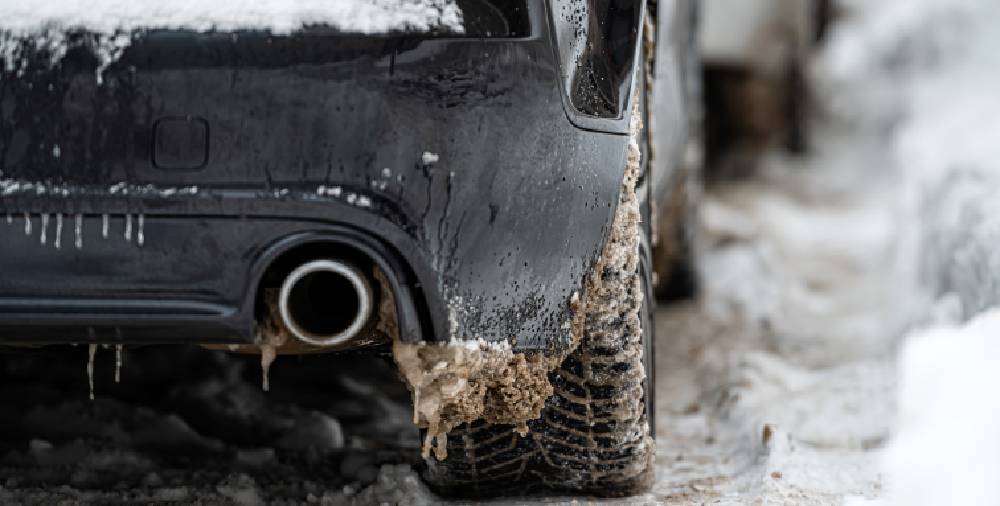Your exhaust system plays a crucial role in your vehicle’s overall performance and safety. When winter comes, it helps to exercise caution and watch out for potential damage to your exhaust from icy road conditions. Keeping your exhaust system in good working condition is crucial for fuel efficiency, safety, and the environment.
What Does the Exhaust System Do?
The exhaust system’s primary purpose is to direct exhaust fumes away from your engine and decrease their harmfulness. The exhaust system also reduces engine noise and ensures optimal engine performance.
Effects of Winter on Your Exhaust System
Winter conditions may have several potential effects on your exhaust system, including:
Destruction
Since the exhaust systems of most vehicles are at the bottom, close to the rear, winter conditions expose them to damage by ice chunks, potholes, debris, and large bumps.
Try to address pipe damage as soon as possible before the problem gets out of hand, as driving your vehicle with a damaged or low-hanging exhaust will rapidly exacerbate the problem.
Water Damage
Winter conditions raise the chances of water damaging your exhaust system. When water and exhaust fumes combine, they form acids that may corrode the stainless steel or metal parts of your exhaust system. If you suspect water damage to your exhaust, hire an experienced mechanic to check it out.
Inhalation of Exhaust Fumes
During winter, ice, snow, or debris may get stuck in your exhaust system. When this happens, exhaust fumes may find their way into the vehicle’s cabin, forcing occupants to breathe in harmful fumes. These poisonous gases need immediate attention as they may cause serious problems.
You want to hire a qualified auto repair mechanic to examine your vehicle’s exhaust system for corrosion or damage to identify potential leaks.
Extra Time Warming Up
During cold weather, short trips take a toll on your exhaust system. When you drive a short distance, the car never heats enough to burn off any accumulated water vapor.
The water may eventually rust out your exhaust system. Always give your engine ample time to warm up before heading out on your trip.
Signs of a Damaged Exhaust System
Your vehicle’s exhaust system will only perform as well as its upkeep and maintenance. Damaged exhaust parts will affect your vehicle’s sound/tone, performance, and fuel economy.
Common signs you have a damaged or failing exhaust system include:
Excessive Engine or Exhaust Noise
Any compromised section of your exhaust will emit a loud or weird sound. Excessive noise or a distinct change in the tone of your exhaust is probably the most apparent sign of a faulty exhaust. The higher sound levels could be due to cracks in the pipe, a leaking manifold gasket, or a rusted muffler.
Reduced Fuel Economy
A significant reduction in fuel economy could be due to several factors, including an underperforming exhaust. A failing exhaust forces your engine to work harder, causing it to burn more fuel.
Slow Acceleration
A leak somewhere in the exhaust may cause delayed acceleration, particularly on take-off from a standing start. Sometimes, the leak may be small enough not to emit much noise.
Strong Gases
The stench of strong gases from anywhere around your vehicle likely means you have a leaking exhaust system. Common culprits include damaged catalytic converters or damage in the pipe before the catalytic converter.
Other Warning Signs
Additional signs of a damaged exhaust system include:
- A misfiring engine
- Rust caused by condensation
- Banging sound under the vehicle
- Colored smoke
- A leaking exhaust manifold
If any of these signs present themselves, it’s time for exhaust repair or replacement. Depending on the issue, an expert may need to fix the exhaust pipes, catalytic converter, oxygen sensor, exhaust pipes, manifold, resonator, muffler, tailpipes, or EGR valves/sensors.
Winter Preparation
While it’s virtually impossible to control the weather and road conditions, the following proactive measures may help you maintain a healthy exhaust system throughout the winter:
Wash Your Vehicle
After a storm or diving on salt-treated roads, wash your car or take it to the car wash for a thorough cleaning. Pay special attention to the car’s undercarriage to eliminate any potential salt buildup.
Avoid Short Trips
Short trips increase the chances of condensed water vapor rusting your exhaust system from the inside. Take longer trips that give your vehicle a chance to eliminate moisture from the exhaust.
Call Us Today
Need help with performance exhaust systems? Trust Performance Muffler for expertise in the automotive exhaust industry, from cat-back exhaust systems to performance mufflers. Call us today at (602) 691-6494 to learn more about our services and discuss your needs.

